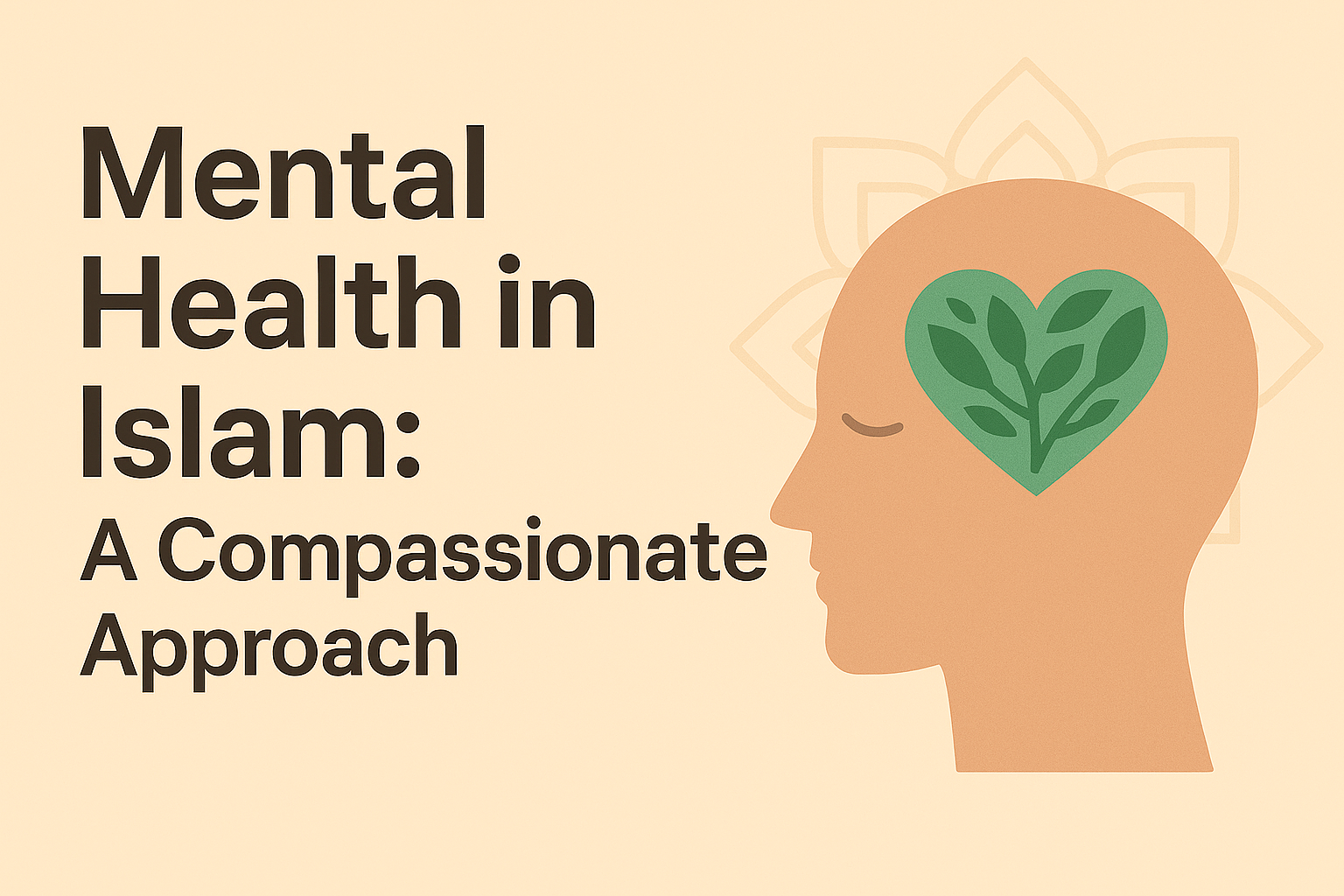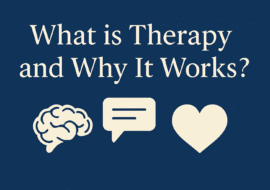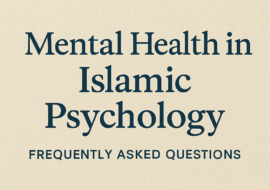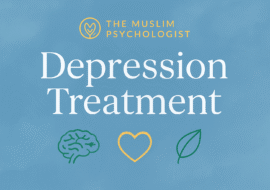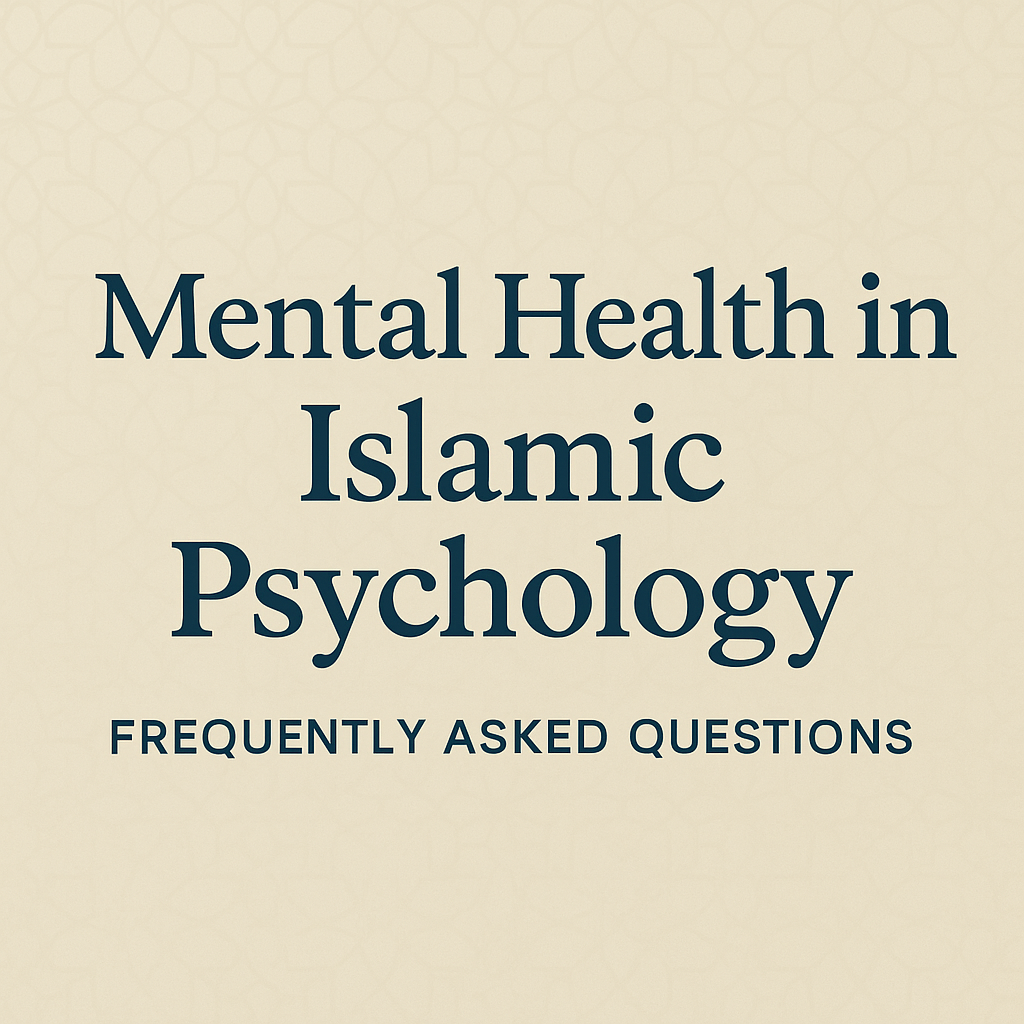
Islamic Psychology in Practice: Mental Health FAQs
How is depression understood in Islamic Psychology?
Islamic Psychology does not see depression as a moral failure or a lack of faith. Instead, it recognizes that the nafs (self) and qalb (heart) can suffer due to various causes. These may include biological imbalances, emotional trauma, social isolation, or spiritual disconnection.
Moreover, classical Islamic texts address emotional suffering with compassion and nuance. For example, huzn (sadness), ghamm (grief), and ḍīq al-ṣadr (tightness in the chest) are all acknowledged in both the Qur’an and Hadith. The Prophet Yaqub (ʿalayhi as-salām), after losing his son Yusuf, experienced deep sorrow, to the point of blindness. Yet, this pain was not seen as a flaw in his faith.
In fact, the Prophet Muhammad ﷺ also expressed sadness when loved ones passed away or during times of rejection and hardship. Therefore, emotional distress is part of the prophetic experience, not a contradiction to it.
From a therapeutic perspective, Islamic Psychology sees depression as a disruption in internal mīzān (balance). As a result, healing involves restoring harmony between the self, the heart, the body, and one’s higher purpose. This approach integrates spiritual guidance with psychological care, encouraging clients to reconnect with meaning, identity, and their relationship with Allah.

What about anxiety? Is it a sign of weak tawakkul (trust in God)?
Not at all. In reality, anxiety is a natural emotional response to perceived threats, uncertainty, or internal conflict. Moreover, the Qur’an openly refers to fear (khawf), grief (huzn), and worry (wajl) as part of human experience. The presence of these emotions does not imply a lack of faith.
In contrast to common misconceptions, Islamic Psychology does not call for suppressing anxiety. Instead, it encourages awareness, reflection, and spiritual coping. Clients are supported in naming their emotions and understanding the source of their discomfort.
For example, feelings of anxiety before exams, social situations, or major life decisions are normal. When approached mindfully, they can become opportunities for growth and insight. In addition, tools like tawakkul (trust), sabr (patience), shukr (gratitude), and regular dhikr (remembrance of God) can help regulate the nervous system and calm the heart.
Furthermore, Al-Ghazali and other scholars emphasized the value of balancing fear and hope (khawf wa raja’)—a concept essential for both emotional regulation and spiritual development. This balance prevents extremes of despair and false confidence, fostering emotional resilience and humility before God.
Consequently, anxiety becomes a space for spiritual refinement, not a reason for self-judgment.

What is the meaning of suffering in Islamic Psychology?
Suffering (balā’) is an unavoidable part of life, but in Islamic thought, it carries deep meaning. Rather than viewing it as punishment, Islamic Psychology sees suffering as a potential tool for purification, spiritual growth, and drawing closer to Allah.
Although pain is difficult, it can awaken reflection, reconnect people with their purpose, and humble the ego. In fact, many verses in the Qur’an and prophetic teachings speak of tests as ways for the believer to refine their soul and increase in sincerity.
For instance, the story of Prophet Ayyub (ʿalayhi as-salām) illustrates profound patience in the face of suffering. He endured physical, emotional, and social pain without losing faith or hope. This teaches us that suffering can exist alongside strong belief.
Islamic Psychology, therefore, validates pain while also encouraging individuals to reflect on what the suffering is pointing toward—whether healing, release, transformation, or surrender.
Additionally, modern psychological research confirms that meaning-making helps reduce distress and increase resilience (Frankl, 2006; Park, 2013). As a result, therapy rooted in Islamic Psychology supports clients in turning suffering into a source of strength.

Are psychological problems a sign of weak īmān (faith)?
Absolutely not. This is a harmful and incorrect belief that discourages people from seeking help and creates shame around mental health. In reality, emotional struggles can affect anyone, regardless of their faith level.
For example, the Prophet Muhammad ﷺ himself made regular duʿāʾ to seek protection from anxiety, sorrow, and helplessness. Similarly, many righteous individuals throughout Islamic history experienced periods of sadness, loneliness, or fear.
Islamic Psychology rejects the false equation between mental illness and weak faith. Instead, it teaches that the nafs (soul/self) is in constant struggle—and that emotional distress can be a sign of internal imbalance, not spiritual failure.
Moreover, scholars such as Ibn Qayyim and Al-Juwayni explored the complexity of the inner world, recognizing that fluctuations in mood, thought, and behavior are part of the human journey. They emphasized compassion, awareness, and intentional self-work (mujāhadah).
In addition, mental illness—just like physical illness—requires attention, understanding, and sometimes professional intervention. Faith can support the healing process, but it does not make one immune to suffering.
Therefore, seeking therapy is not a sign of weakness, but a sign of maturity, humility, and responsibility for one’s well-being.

References:
- American Psychiatric Association. (2022). Diagnostic and statistical manual of mental disorders (5th ed., text rev.; DSM-5-TR®). American Psychiatric Publishing.
- Elkadi, A. (2015). Concept of the Self in Islam and Modern Psychology. IIIT.
- Frankl, V. E. (2006). Man’s Search for Meaning. Beacon Press.
- Haque, A. (2004). Psychology from Islamic perspective: Contributions of early Muslim scholars and challenges to contemporary Muslim psychologists. Journal of Religion and Health, 43(4), 357–377.
- Krause, N., & Hayward, R. D. (2012). Religion, meaning in life, and change in physical functioning during late adulthood. Journal of Adult Development, 19(3), 158–169.
- Park, C. L. (2013). Religion and meaning. In R. F. Paloutzian & C. L. Park (Eds.), Handbook of the psychology of religion and spirituality (2nd ed., pp. 357–379). Guilford Press.
- Rassool, G. H. (2021). Islamic Psychology: Human Behaviour and Experience from an Islamic Perspective. Routledge.


